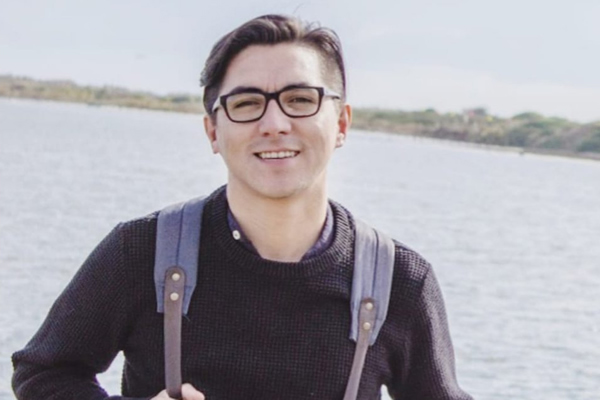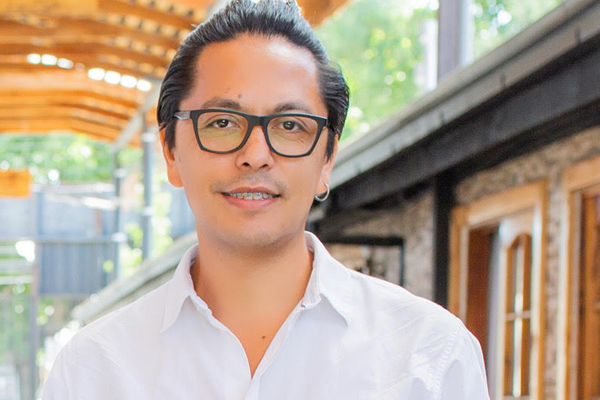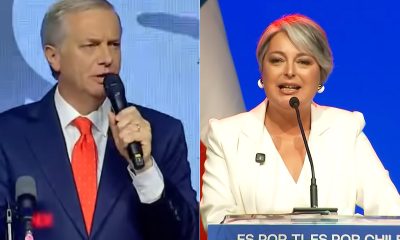News
Elections in Chile: LGBTQ candidates make their mark
Eight queer people elected to write new Constitution

Editor’s note: The Washington Blade published a Spanish version of this story on May 20.
CONCEPCIÓN, Chile — LGBTQ activists and organizations celebrated the results of last weekend’s historic elections in Chile in which eight openly queer candidates were elected to write the Latin American country’s new Constitution.
They are Jennifer Mella, Valentina Miranda, Bessy Gallardo, Pedro Muñoz, Javier Fuchslocher, Gaspar Domínguez, Rodrigo Rojas and Tomás Laibe, who represent 5.2 percent of the total of 155 seats that will make up the Constitutional Convention.
“Although the representation of people with different sexual diversities remains low, it is a historic step to have constituencies that allow us to install the urgency of our demands, and promote respect and protection of the rights of the LGBTIQ+ population in the new constitution and in society. The commitment of feminist and progressive forces regarding these issues will also be very relevant, and as an observatory we will be attentive to that discussion,” explained Marion Stock, coordinator of Les Constituyentes, Marion Stock, in a statement after the votes were counted.
The Movement for Homosexual Integration and Liberation (Movilh), meanwhile, described “as historic that eight openly LGBTIQ+ people had been elected as constituents, inasmuch as this allows the rich diversity of Chile to have a voice and vote in the most important transformation process faced by the country.”
“We hope that the new constitution explicitly guarantees nondiscrimination based on sexual orientation, gender identity and expression; as well as by all the categories protected in the Zamudio Law; and full equality of rights is recognized for all individuals, couples and families, whatever their composition. Only with this, each and every one of the homo/transphobic laws and public policies that still persist in Chile can be eliminated at once,” said Movilh spokesperson Óscar Rementería.
Laibe from the Socialist Party of Chile, who was elected in the southernmost area of the country, views his presence and that of seven other LGBTQ people at the convention will help replace the current constitution as a cultural milestone. The current Chilean constitution has been in place since Augusto Pinochet’s military dictatorship.
“I think it is a milestone that, first, we have had more than 40 candidates of sexual diversity to this Constitutional Constitution,” said the political scientist during an interview with Lo Que Queda del Día on Cooperativa radio. “It is a milestone in the history of Chile and it will probably set the tone for what the rest of the elections, in which I am sure we will have more of a presence, will be.”
He added that “we feel proud in our case, because we were the only diverse candidacy in the southern region, where we are so isolated and suddenly we are much more conservative than in the rest of the country and we do not realize that in Santiago they pass things and that perhaps there is a cultural advance that is very different from what is happening in the regions.”
“It has been very important to nail down this flag, to talk about sexual diversity throughout the campaign to try to make visible this problem that is part, I think, of the diagnosis of the social outbreak: There are flags that have been hidden, invisible, for a long time; there are people who feel discrimination every day and who experience inequality and discriminatory treatment in education, health, at work,” said Laibe. “That is going to be, without a doubt, one of the struggles that we are going to have to address in the Constitutional Convention.”
Chileans in the last elections not only elected Constitutional Convention members. They chose their new community and regional representatives. And the LGBTQ community also saw positive results in these races.
The Washington Blade spoke with Cristian Martínez, an LGBTQ activist who was elected as a councilmember in Molina, a city that is 210 kilometers south of the Chilean capital of Santiago.
His race made national news a few weeks ago due to the fact that an Adventist college distributed openly anti-LGBTQ text to its students. Martínez last Sunday made history in Molina as the first openly gay person to be elected as an elected official in his home region.
“My city and my region is rural and conservative. We are a rural area, however, there is a process of change and that is demonstrated by the fact that they have elected me, an openly gay person as a councilor, but it is slower than what is happening in the big cities, I believe that we are going slower here with respect to the LGBTQ+ community and particularly trans people, therefore visibility is the most important thing,” Martínez told the Blade.
“As long as residents do not know trans people, lesbian, bisexual, gay, intersex people, etc., they will not know how to love, respect and welcome them, I believe that making ourselves visible is the most important thing and there you have to do a job that we are advancing. I believe that my town is willing to advance on these issues, but the challenge is huge. There are slightly more conservative Christian communities that also exert social pressure in certain spaces. I believe that this will be lessened as we become more visible,” concluded the now-elected councilor.
Martínez told the Blade that it was “super important” for LGBTQ activists “to participate in these elections because after the social outbreak, all activists and people who participated in social movements felt the responsibility and obligation to assume responsibilities of popular election in the elections that took place. they came, in our territories, in our communes, in our spaces.”
Chile, in this way, leaves behind the prejudices that say LGBTQ people are unqualified to hold public office and this will allow further political inroads, especially in the next elections in November when Chileans go back to the polls to elect a president and members of Congress.

Cristian Martínez (Photo courtesy of Cristian Martínez)
Kansas
ACLU sues Kansas over law invalidating trans residents’ IDs
A new Kansas bill requires transgender residents to have their driver’s licenses reflect their sex assigned at birth, invalidating current licenses.

Transgender people across Kansas received letters in the mail on Wednesday demanding the immediate surrender of their driver’s licenses following passage of one of the harshest transgender bathroom bans in the nation. Now the American Civil Liberties Union is filing a lawsuit to block the ban and protect transgender residents from what advocates describe as “sweeping” and “punitive” consequences.
Independent journalist Erin Reed broke the story Wednesday after lawmakers approved House Substitute for Senate Bill 244. In her reporting, Reed included a photo of the letter sent to transgender Kansans, requiring them to obtain a driver’s license that reflects their sex assigned at birth rather than the gender with which they identify.
According to the reporting, transgender Kansans must surrender their driver’s licenses and that their current credentials — regardless of expiration date — will be considered invalid upon the law’s publication. The move effectively nullifies previously issued identification documents, creating immediate uncertainty for those impacted.
House Substitute for Senate Bill 244 also stipulates that any transgender person caught driving without a valid license could face a class B misdemeanor, punishable by up to six months in jail and a $1,000 fine. That potential penalty adds a criminal dimension to what began as an administrative action. It also compounds the legal risks for transgender Kansans, as the state already requires county jails to house inmates according to sex assigned at birth — a policy that advocates say can place transgender detainees at heightened risk.
Beyond identification issues, SB 244 not only bans transgender people from using restrooms that match their gender identity in government buildings — including libraries, courthouses, state parks, hospitals, and interstate rest stops — with the possibility for criminal penalties, but also allows for what critics have described as a “bathroom bounty hunter” provision. The measure permits anyone who encounters a transgender person in a restroom — including potentially in private businesses — to sue them for large sums of money, dramatically expanding the scope of enforcement beyond government authorities.
The lawsuit challenging SB 244 was filed today in the District Court of Douglas County on behalf of anonymous plaintiffs Daniel Doe and Matthew Moe by the American Civil Liberties Union, the ACLU of Kansas, and Ballard Spahr LLP. The complaint argues that SB 244 violates the Kansas Constitution’s protections for personal autonomy, privacy, equality under the law, due process, and freedom of speech.
Additionally, the American Civil Liberties Union filed a temporary restraining order on behalf of the anonymous plaintiffs, arguing that the order — followed by a temporary injunction — is necessary to prevent the “irreparable harm” that would result from SB 244.
State Rep. Abi Boatman, a Wichita Democrat and the only transgender member of the Kansas Legislature, told the Kansas City Star on Wednesday that “persecution is the point.”
“This legislation is a direct attack on the dignity and humanity of transgender Kansans,” said Monica Bennett, legal director of the ACLU of Kansas. “It undermines our state’s strong constitutional protections against government overreach and persecution.”
“SB 244 is a cruel and craven threat to public safety all in the name of fostering fear, division, and paranoia,” said Harper Seldin, senior staff attorney for the ACLU’s LGBTQ & HIV Rights Project. “The invalidation of state-issued IDs threatens to out transgender people against their will every time they apply for a job, rent an apartment, or interact with police. Taken as a whole, SB 244 is a transparent attempt to deny transgender people autonomy over their own identities and push them out of public life altogether.”
“SB 244 presents a state-sanctioned attack on transgender people aimed at silencing, dehumanizing, and alienating Kansans whose gender identity does not conform to the state legislature’s preferences,” said Heather St. Clair, a Ballard Spahr litigator working on the case. “Ballard Spahr is committed to standing with the ACLU and the plaintiffs in fighting on behalf of transgender Kansans for a remedy against the injustices presented by SB 244, and is dedicated to protecting the constitutional rights jeopardized by this new law.”
National
After layoffs at Advocate, parent company acquires ‘Them’ from Conde Nast
Top editorial staff let go last week

Former staff members at the Advocate and Out magazines revealed that parent company Equalpride laid off a number of employees late last week.
Those let go included Advocate editor-in-chief Alex Cooper, Pride.com editor-in-chief Rachel Shatto, brand partnerships manager Erin Manley, community editor Marie-Adélina de la Ferriére, and Out magazine staff writers Moises Mendez and Bernardo Sim, according to a report in Hollywood Reporter.
Cooper, who joined the company in 2021, posted to social media that, “Few people have had the privilege of leading this legendary LGBTQ+ news outlet, and I’m deeply honored to have been one of them. To my team: thank you for the last four years. You’ve been the best. For those also affected today, please let me know how I can support you.”
The Advocate’s PR firm when reached by the Blade said it no longer represents the company. Emails to the Advocate went unanswered.
Equalpride on Friday announced it acquired “Them,” a digital LGBTQ outlet founded in 2017 by Conde Nast.
“Equalpride exists to elevate, celebrate and protect LGBTQ+ storytelling at scale,” Equalpride CEO Mark Berryhill said according to Hollywood Reporter. “By combining the strengths of our brands with this respected digital platform, we’re creating a unified ecosystem that delivers even more impact for our audiences, advertisers, and community partners.”
It’s not clear if “Them” staff would take over editorial responsibilities for the Advocate and Out.

In an official statement released at the reveal event Capital Pride Alliance described its just announced 2026 Pride theme of “Exist, Resist, Have the Audacity” as a “bold declaration affirming the presence, resilience, and courage of LGBTQ+ people around the world.”
The statement adds, “Grounded in the undeniable truth that our existence is not up for debate, this year’s theme calls on the community to live loudly and proudly, stand firm against injustice and erasure, and embody the collective strength that has always defined the LGBTQ+ community.”
In a reference to the impact of the hostile political climate, the statement says, “In a time when LGBTQ+ rights and history continue to face challenges, especially in our Nation’s Capital, where policy and public discourse shape the future of our country, together, we must ensure that our voices are visible, heard, and unapologetically centered.”
The statement also quotes Capital Pride Alliance CEO and President Ryan Bos’s message at the Reveal event: “This year’s theme is both a declaration and a demand,” Bos said. “Exist, Resist, Have Audacity! reflects the resilience of our community and our responsibility to protect the progress we’ve made. As we look toward our nation’s 250th anniversary, we affirm that LGBTQ+ people have always been and always will be part of the United States’s history, and we will continue shaping its future with strength and resolve,” he concluded.



















